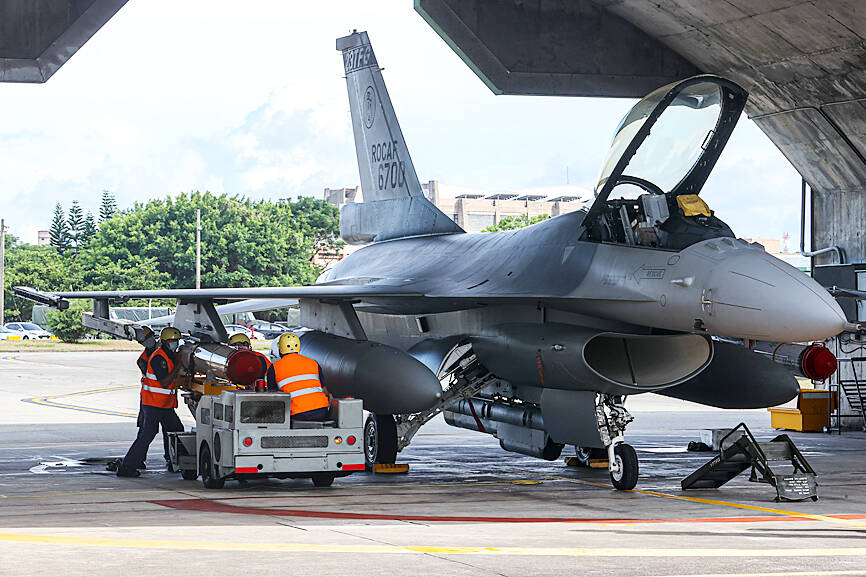A US government funding bill for next year that was unveiled on Tuesday authorized US$2 billion in loans to Taiwan to buy weapons, but did not include grants for similar purposes that had been approved in a separate defense bill.
The Omnibus Consolidated Appropriations Act, covering funding for the US government for fiscal 2023, allowed up to US$2 billion in direct loans to Taiwan under the Foreign Military Financing Program.
That was consistent with provisions in the Fiscal 2023 National Defense Authorization Act (NDAA), which was passed earlier this month by the US House of Representatives and the US Senate.

Photo: CNA
However, the appropriations bill left out a provision in the NDAA that called for the provision of grants to Taiwan of up to US$2 billion annually from 2023 to 2027 for military-related purposes amid military pressure from China.
The grants were part of another bill, called the Taiwan Enhanced Resilience Act, that was folded into the NDAA.
US Senator James Inhofe, the top Republican on the Senate Armed Services Committee, said he was disappointed with the outcome.
“I remain disappointed that the [US President Joe] Biden administration refuses to comply with congressional inquiries regarding Taiwan’s military needs and refuses to request money to implement the Taiwan Enhanced Resilience Act,” Inhofe said in a statement. “This is simply another national security misstep by the administration.”
Defense News reported that the top Democrat and Republican on the Senate Foreign Relations Committee, US senators Bob Menendez and James Risch respectively, were pushing for up to US$500 million in grants, while US Senator Lindsay Graham advocated loans.
“You’ve got all kinds of needs. You’ve got a famine all over the world. You’ve got food shortages. I want to be helpful to Taiwan, but probably the better approach is loans,” Graham was quoted as saying by Defense News.
Despite the passage of the NDAA, grants and loans must still be proposed through appropriation bills and approved by the US Congress before Taiwan can receive them.
The Consolidated Appropriations Act provides US$1.7 trillion in discretionary resources for the US government in fiscal 2023, a news release issued by the Senate Appropriations Committee said.
In total, the regular 12 appropriations bills include US$800 billion in non-defense funding, a 9.3 percent increase over the funding for fiscal 2022.
This is the highest level of non-defense funding ever.
The bill also provides US$858 billion in defense funding, the news release said.

INVESTIGATION: The case is the latest instance of a DPP figure being implicated in an espionage network accused of allegedly leaking information to Chinese intelligence Democratic Progressive Party (DPP) member Ho Jen-chieh (何仁傑) was detained and held incommunicado yesterday on suspicion of spying for China during his tenure as assistant to then-minister of foreign affairs Joseph Wu (吳釗燮). The Taipei District Prosecutors’ Office said Ho was implicated during its investigation into alleged spying activities by former Presidential Office consultant Wu Shang-yu (吳尚雨). Prosecutors said there is reason to believe Ho breached the National Security Act (國家安全法) by leaking classified Ministry of Foreign Affairs information to Chinese intelligence. Following interrogation, prosecutors petitioned the Taipei District Court to detain Ho, citing concerns over potential collusion or tampering of evidence. The

NEGOTIATIONS: Taiwan has good relations with Washington and the outlook for the negotiations looks promising, Minister of Economic Affairs J.W. Kuo said Taiwan’s GDP growth this year is expected to decrease by 0.43 to 1.61 percentage points due to the effects of US tariffs, National Development Council (NDC) Minister Paul Liu (劉鏡清) said at a meeting of the legislature’s Economics Committee in Taipei yesterday, citing a preliminary estimate by a private research institution. Taiwan’s economy would be significantly affected by the 32 percent “reciprocal” tariffs slapped by the US, which took effect yesterday, Liu said, adding that GDP growth could fall below 3 percent and potentially even dip below 2 percent to 1.53 percent this year. The council has commissioned another institution

NEGOTIATIONS: The US response to the countermeasures and plans Taiwan presented has been positive, including boosting procurement and investment, the president said Taiwan is included in the first group for trade negotiations with the US, President William Lai (賴清德) said yesterday, as he seeks to shield Taiwanese exporters from a 32 percent tariff. In Washington, US Trade Representative Jamieson Greer said in an interview on Fox News on Thursday that he would speak to his Taiwanese and Israeli counterparts yesterday about tariffs after holding a long discussion with the Vietnamese earlier. US President Donald Trump on Wednesday postponed punishing levies on multiple trade partners, including Taiwan, for three months after trillions of US dollars were wiped off global markets. He has maintained a 10 percent

TRADE: The premier pledged safeguards on ‘Made in Taiwan’ labeling, anti-dumping measures and stricter export controls to strengthen its position in trade talks Products labeled “made in Taiwan” must be genuinely made in Taiwan, Premier Cho Jung-tai (卓榮泰) said yesterday, vowing to enforce strict safeguards against “origin laundering” and initiate anti-dumping investigations to prevent China dumping its products in Taiwan. Cho made the remarks in a discussion session with representatives from industries in Kaohsiung. In response to the US government’s recent announcement of “reciprocal” tariffs on its trading partners, President William Lai (賴清德) and Cho last week began a series of consultations with industry leaders nationwide to gather feedback and address concerns. Taiwanese and US officials held a videoconference on Friday evening to discuss the